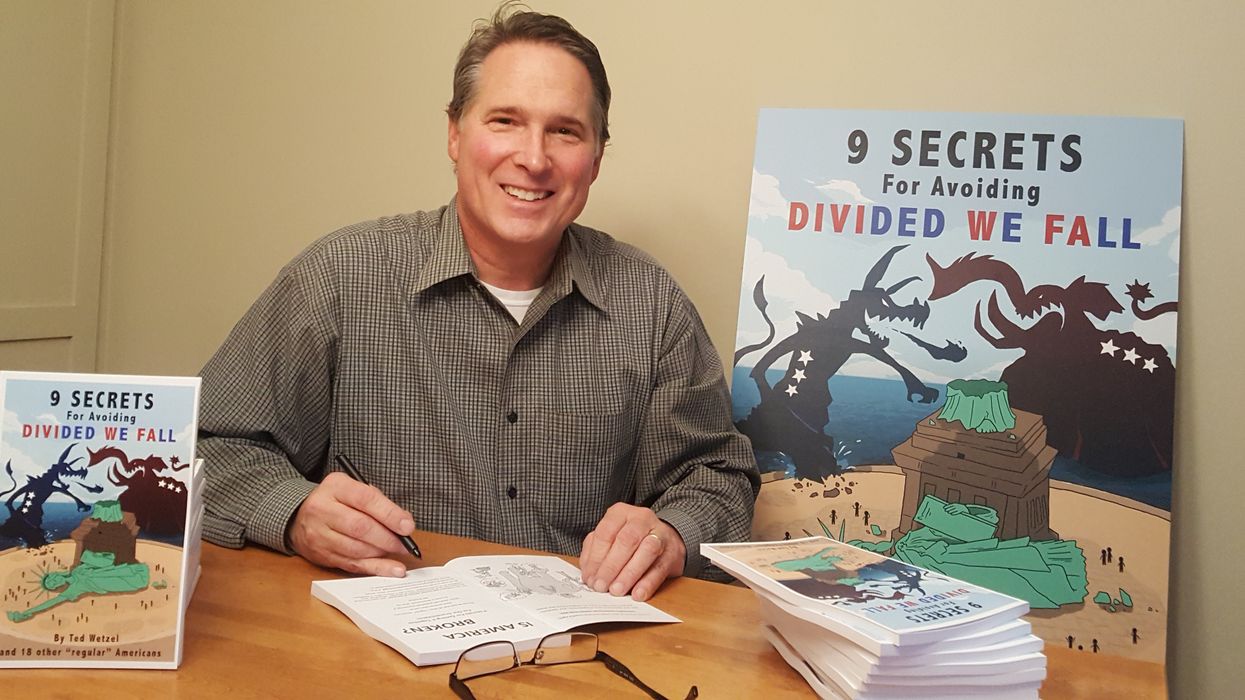A lifelong resident of the Cleveland area, Ted Wetzel is an engineer who spent five years at a Fortune 500 company, 17 years in marketing and management at smaller manufacturers, and then 11 years as a small-business owner before turning to his passion project. He created Fighting to Understand to spread the message that civic education and a collaborative spirit among everyday Americans can restore the core values of a democratic republic for the next generation. With a diverse group of 18 collaborators, in October he self-published the first edition of a book now titled "9 Secrets for Avoiding Divided We Fall" and is working on a plan for widespread distribution this spring. His answers have been lightly edited for clarity and length.
What's democracy's biggest challenge, in 10 words or less.
Most people don't want freedom; they would settle for a just master. (I'm not sure who to attribute this verse to.)
Describe your very first civic engagement.
In about 1995 I revived our homeowners' association. We had very few civic problems, so our goal was to create a spirit of neighborliness. One lesson is that relationships have a certain inertia that carries the spirit for decades but attrition will also weaken the spirit, often in a stealthy way. So an intentionality of inclusion is a leadership trait to be relished.
After what I view as my second civic engagement, coaching Little League, I focused on my career until 18 months ago. Then a switch flipped inside of me, asking, "Is America broken?" What would an average citizen learn if they could call time out to study that question full time? Feeling that there was no choice, I handed off my business responsibilities and went on a search for America. Now we hope the book brings hope to Americans, and we hope the book gives Americans options for how to get involved in We the People 2.0.
What was your biggest professional triumph?
Being part of an authentically functional leadership team, as VP of sales and marketing at a company that designed and manufactured switches and electronics for appliances. The cherry on top was staging celebrations, including song parodies performed by employees, when we received a supplier performance award from an appliance company. Oh — the cake onto which the cherry was placed was growing in 15 years from $4 million to $32 million in revenue.
And your most disappointing setback?
After the switch company, I purchased a small paint contracting business. We survived for 11 years but, when I'm honest with myself, my formula for growth by liberating the employees to build a virtuous cycle of opportunity was not well founded
How does some aspect of your identity influence the way you go about your work?
If I had to pick one word for my identity, perhaps "searcher" is appropriate. That's the trait that made it a joy to go after answers to the question "Is America broken?" Although there are quite a lot of common values among us Americans, I continue to be amazed that even after my 200th interview, the one after that always added a new insight. So it follows that many early answers to my question ended up in the recycle bin. Perhaps that makes me more of a "re-searcher."
What's the best advice you've ever been given?
Life is like a bicycle. It is easiest to steer if you keep moving.
Create a new flavor for Ben & Jerry's.
Red, White & You! The packaging concept is: The quart is split down the center to form half-moon shapes — but they stay together so you have to pass it back and forth. And each side is filled with striped or swirled red and white. And it's packaged with 2 spoons.
What's your favorite political movie or TV show?
"Poldark," the British historical period drama on PBS that starts at the end of the 18th century. I like that bad things happen for no good reason to good people, people die, trusts are compromised, famine strikes, envy festers — and life goes on, forgiveness is found, new growth sprouts and it takes a village.
What's the last thing you do on your phone at night?
Set the alarm. More importantly, for my first phone contact in the morning, I enjoy a short meditation email from the Center for Action and Contemplation.
What is your deepest, darkest secret?
I'd be lost without Post-It Notes. When I'm in searcher mode, I can fill up walls with them.




















